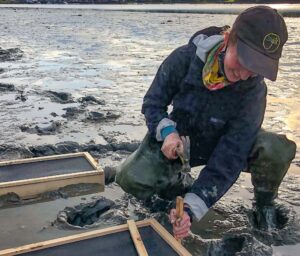Building Knowledge and Capacity for Community-Led Coastal Stewardship
Institution: University of Maine
Sponsor: Senator George J. Mitchell Center for Sustainability Solutions
Funding for this program is also provided by local donors to the Darling Marine Center and a grant from the Broad Reach Fund to the Town of Damariscotta.

Developing a community science program that works with local students, harvesters, and municipal leaders to collect information on shellfish and document how the Damariscotta River estuary is changing.
Marine ecosystems and the human communities that depend on them are complex and dynamic social-ecological systems. Knowledge of these dynamics is needed to sustain both ecological and human communities. Yet fine-scale data relevant to specific places are often lacking. The Damariscotta River estuary in Maine is no exception; the municipal body responsible for shellfish co-management (the Joint Shellfish Committee of Damariscotta and Newcastle) is challenged by the limited data available to them.
There is a need to generate fine-scale information about the ecosystems and key species of the Damariscotta, together with information on how people use and value the estuary. While there have been notable university-, community- and government-led environmental monitoring efforts for certain species or in specific parts of the estuary, these efforts often have been of limited duration.
The University of Maine Darling Marine Center (DMC), in partnership with the Damariscotta-Newcastle Joint Shellfish Committee and Lincoln Academy, is developing a community science research program in the Damariscotta River estuary. The team is working with local scientists, students, educators, harvesters, and municipal leaders to collect information on shellfish and document how the estuary is changing. The research will provide important information on the estuary’s ecology and the diversity of commercial and recreational activities on the river and also enable students to gain hands-on experience in data collection, interpretation and application.
Sarah Risley, a UMaine School of Marine Sciences graduate student based at the DMC, is leading a team of undergraduate and high school students to record the number, type and size of shellfish species at several sites along the upper Damariscotta River and document the knowledge of fishermen and other local residents. Together, this information will be used to estimate the number of shellfish on the flats and help inform future management by the shellfish committee in coordination with the state’s Department of Marine Resources.
One of the primary goals for this research is to assess the availability of shellfish larvae (also called spat) to seed populations in the upper part of the estuary. This area includes the majority of clam flats managed jointly by the two towns and has also been identified by harvesters and other local experts as a place where significant changes in shellfish abundance and distribution have occurred over the last two decades.
This community science project connects with multiple courses taught at Lincoln Academy, as well as university courses and research projects at the Darling Marine Center. The place-based knowledge generated in this project will be integrated with existing datasets on water quality, coastal oceanography and marine organisms that have been gathered by DMC-based researchers and others (e.g., Maine Department of Marine Resources, Bigelow Laboratory for Ocean Sciences, Coastal Rivers Conservation Trust) over multiple decades.
The project also supports the collaboration, research design, and communication structures needed to develop and share information within our community about how the Damariscotta River estuary is changing through time. The experience developing this program will be of value to other coastal communities, particularly but not limited to Maine, where individuals and communities are seeking ways to work together to observe, respond and adapt to environmental change.
Project Lead
- Heather Leslie, Director, Darling Marine Center, Professor, School of Marine Sciences;,Faculty Fellow, Mitchell Center, UMaine
Research Team
- Sarah Risley, dual degree master’s student, Darling Marine Center and School of Marine Sciences, UMaine
- Joshua Stoll, Assistant Professor, School of Marine Sciences, and Faculty Fellow, Mitchell Center, UMaine
- Matthew Lutkus, Town Manager, Town of Damariscotta
- Kelley Duffy, Director of Curriculum & Instruction, Lincoln Academy
Project Partners
Resources
- Student-led community science program to support shellfish management (DMC News, 5/17/21)
- Strengthening Coastal Economies (Mitchell Center project)
- Learn more about related work at the Maine Coastal Community Resilience Project website
- Joshua Stoll’s website
